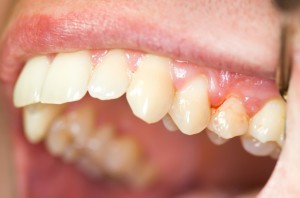The onset and progression of periodontal disease


Symptoms of Periodontal Disease
Gum disease tends not to produce noticeable symptoms until it has progressed to a point where some sort of treatment is required. If you notice any of the following symptoms, you should bring them to your dentist’s attention so he can recommend treatment right away.
- Bleeding when you brush your teeth
- Swelling in the gum tissue
- A red or purplish tint to the gums
- Shiny-looking gums
- Growing sensitivity in the teeth
Gums also begin to pull away from the tooth roots in the earlier stages of periodontal disease, but this is generally diagnosed by your dentist during a regular checkup. Your dentist measures the pockets around the base of your teeth to see how deep they are. If they are deeper than one or two millimeters, this could indicate the beginnings of a gum infection.
If your dentist notices the beginning stages of gum disease, be sure to follow the recommended treatment to keep the inflammation from progressing and becoming more serious. If left untreated, periodontal disease can eventually lead to tooth loss.
Treatment for Periodontal Disease
In its earliest stages, periodontal disease responds to relatively simple treatments. Your dentist or periodontist might recommend a special toothpaste or mouthwash to help reduce the inflammation. Baking soda toothpaste, a localized peroxide treatment, or an antibacterial mouthwash might be added to your regular dental regimen.
As infection worsens, however, more invasive treatments are necessary. A deep cleaning cleans under the gums, removing infected tissue and built-up plaque and tartar and smoothing the surfaces of the upper part of the tooth roots to reduce future plaque buildup. Gum surgery becomes necessary in very severe cases to remove the infected gum tissue completely. Sometimes new tissue is grafted onto the gums. Often this tissue is harvested from the roof of your mouth. With careful everyday care and regular visits to the dentist, you can avoid having to resort to this kind of complex treatment.
Are you seeking gum treatment in Dallas? Contact our caring and professional team and call us today!